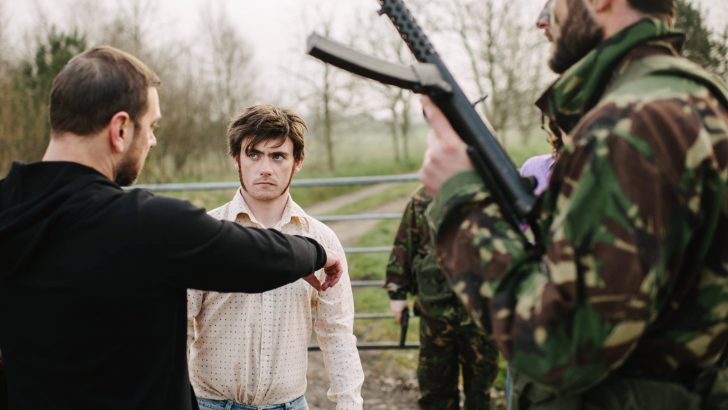Sometimes I shy away from worthy programmes because I’m not in the mood or I think they’ll be too sad or grim. Fortunately I resisted that temptation on Wednesday of last week.
Unquiet Graves (RTÉ One) was indeed sad and grim, but it was also inspiring story about the thirst for justice.
It told the disturbing story of the Glenanne killers – a loyalist murder gang operating in South Armagh in the 1970’s, responsible for around 120 sectarian murders. There was much evidence of collusion involving elements in the security forces, often providing anything but security for the Catholic population.
Sometimes even policemen officially on duty were involved in some of the murders.
Strangely these loyalist paramilitaries didn’t go after the IRA, but rather innocent civilians. There were stories of whole families attacked as they relaxed at home, communities targeted as their local pubs were shot up or blown up, or both, a mother killed as she put her children to bed, the unborn children killed before they got a chance to be born.
Extremists
Atrocities by Republican paramilitaries were not forgotten (e.g. the awful Kingsmill massacre of Protestant textile workers) but it wasn’t the focus of this particular documentary. In a planned revenge for Kingsmill, there was the shocking story of a plot to kill teachers and pupils at a Catholic primary school – even that was too extreme for some extremists.
Some stories were familiar – the Miami Showband massacre, for example. Others, like the targeting of whole families less so, but the grief was the same.
Unbelievably the surviving victims and relatives are still waiting for justice and truth. Over the years the authorities up north have seemed reluctant and unwilling to carry through any investigations to their appropriate conclusion for fear, presumably, of what would be revealed – some contributors suspected the conspiracy of silence went quite high up the chain of authority.
Two priests, the late Fr Dennis Faul and Fr Raymond Murray, were doing far better detective work, linking these murders to one particular gang. Even the Irish Government seemed hesitant to pursue the investigations, despite the murders spilling over into the South with the Dublin and Monaghan bombs.
I don’t normally like dramatic re-enactments, but the few acted out here helped to capture the fear and dread of being stopped at a dodgy checkpoint, or of being pulled over on a dark country road.
Stephen Rea was the ideal narrator, and towards the end an evocative animation accompanied one of Seamus Heaney’s poems – written about a cousin of his who was murdered. The final roll call of victims was a fitting tribute and packed quite a punch.
Restrictions
In other sorry matters, the further restrictions announced for Dublin due to Covid-19 meant that religious services had to go online for three weeks. David Quinn, of this parish and the Iona Institute, wasn’t convinced that the evidence justified such restrictions. On The Pat Kenny Show (Newstalk) last Friday he reminded us that in France, a much more secular state, the courts had struck down similar measures as they interfered with the right to public worship.
He obviously felt for the thousands of volunteers keeping the churches safe, and pointed out that there were no known clusters associated with religious services. He thought Church leaders seemed to be passively accepting the new restrictions. Pat Kenny countered that there would inevitably be mixing after such services.
One Church leader did speak out – on This Week (RTÉ Radio 1, Sunday) Archbishop Diarmuid Martin was more in civic responsibility mode than pursuing any special pleading. Like Mr Quinn he was conscious of the ‘huge efforts’ being made in parishes to keep congregations safe. He thought sacraments were too special to be rushed, and that it was important for parents to be present, not just watching online.
Finally, I’m not impressed with RTÉ’s self-congratulatory ad about how good RTÉ News is, though it’s visually striking with various wild characters bearing down on an innocent web surfer. The message is useful – it’s hard to know what’s true online with so much deception and rage. We are assured that RTÉ News provides trust, integrity and the truth! Of course ‘the truth matters’, and admittedly it’s a lot better than Fox News or CNN, but surely we should exercise our critical faculties on all news sources, seek our information from a wide variety of them and then come to our own opinions?
Pick of the week
Mass
RTÉ One, Sunday, September 27, 11 am
Fr Alan Hilliard celebrates Mass on the World Day of Migrants and Refugees 2020. Music is by the Divine Mercy Family Choir.
The Meaning of Life
RTÉ One, Sunday, September 27, 10.30 pm
Joe Duffy meets developer and entrepreneur Harry Crosbie in an empty Vicar Street to talk about how a life filled with stars and business highs and lows has shaped his own philosophy and values.
Drivetime
RTÉ Radio 1, Monday, September 28, 4.30 pm
Sarah McInerney and Cormac Ó hEadhra take over at Drivetime bringing you all the latest news from around the country and beyond.


 Brendan O’Regan
Brendan O’Regan A scene from Unquiet Graves (RTÉ One). Photo: © RTÉ/
a film by Seán Murray
A scene from Unquiet Graves (RTÉ One). Photo: © RTÉ/
a film by Seán Murray 